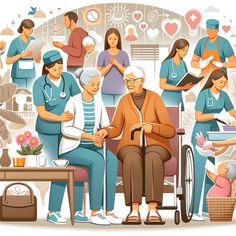
Table of Contents
The Vital Role of Caregivers in Healthcare
Introduction
Picture Michael, a devoted husband, patiently assisting his wife, Sarah, after a knee replacement surgery. Michael meticulously helps Sarah with physical therapy exercises, ensures she takes her medication on time and offers unwavering emotional support. His dedication goes beyond being a spouse; Michael embodies the Vital Role of Caregivers in Healthcare. Caregivers like him are the silent partners in countless recovery journeys, crucial in promoting patient well-being and a smoother healthcare experience.
The demographics of our society are shifting. The ageing population is on the rise, with the number of adults aged 65 and over projected to reach 90 million by 2060, according to the U.S. Census Bureau https://www.census.gov/. This, coupled with rising healthcare costs and a growing preference for ageing at home, has fueled the demand for caregivers. These dedicated individuals bridge the gap between hospital care and independent living, providing essential support for patients navigating illness, recovery, and chronic conditions.
While often overlooked, caregivers are the backbone of the medical industry. This article will delve into the Vital Role of Caregivers in Healthcare, demonstrating their multifaceted contributions. We will explore how caregivers enhance patient well-being, improve the efficiency of the healthcare system, and provide invaluable support for families. By understanding the Vital Role of Caregivers in Healthcare, we can recognize their significance and advocate for better support systems for these dedicated individuals.
Contributions to Patient Well-being: The Unsung Heroes of Recovery

Caregivers play a critical role in ensuring a patient’s well-being, providing constant support and assistance throughout the recovery journey. Their contributions extend far beyond simply providing physical care. Let’s delve deeper into how caregivers enhance patient well-being within the healthcare system.
• Physical Care and Support:
Imagine a patient recovering from surgery, struggling with basic daily activities like Bathing, Dressing, and getting around. Caregivers step in to bridge this gap, providing essential assistance with Activities of Daily Living (ADLs) such as:
- Bathing and personal hygiene
- Dressing and grooming
- Toileting and continence care
- Mobility and transferring
- Meal preparation and feeding
- Opens in a new window alzheimerscaregivers.org
- Caregiver assisting patient with Bathing
- Caregivers promote a sense of normalcy and dignity during recovery by ensuring patients receive proper care with ADLs.
Medical Management: MCaregivers often become an extension of the medical team, assisting with medication management and monitoring a patient’s health. This includesAdministering medications according to doctor’s orders
- Monitoring vital signs such as temperature, blood pressure, and pulse
- Dressing wounds and monitoring healing progress
- Observing for any changes in the patient’s condition and reporting them to healthcare professionals
- Opens in a new window advanced-homehealthcare.com
- Caregiver giving medication to patient
This meticulous attention to medical details helps ensure patients adhere to treatment plans and promotes timely intervention if any complications arise.
Emotional Support and Companionship: Recovery is not just a physical process; it’s also an emotional journey. Caregivers provide emotional support, offering companionship, empathy, and a listening ear. They can:
- Help patients cope with anxiety, fear, and frustration
- Offer encouragement and motivation throughout the recovery process
- Celebrate milestones and achievements, no matter how small
- Advocate for the patient’s needs and preferences within the healthcare system
This emotional support system fosters a sense of well-being and empowers patients to face challenges positively.
Promoting Independence and Dignity: A core aspect of The Vital Role of Caregivers in Healthcare is empowering patients to maintain a sense of independence and control over their lives as much as possible. Caregivers achieve this by:
- Encouraging patients to participate in self-care activities whenever possible
- Providing assistance in a way that respects the patient’s dignity and privacy
- Adapting the care plan to accommodate the patient’s abilities and limitations
- Helping patients regain lost skills and encouraging them to set achievable goals
- By fostering independence, caregivers promote a sense of self-worth and a faster patient return to normalcy.
Reduced Hospital Readmissions: Effective caregiving at home can significantly reduce the risk of hospital readmissions. Caregivers can:
- Identify early warning signs of potential complications
- Ensure patients adhere to medication schedules and treatment plans
- Provide a safe and supportive environment conducive to healing
- By proactively managing a patient’s health at home, caregivers can help prevent unnecessary hospital stays and promote a smoother recovery process.
In conclusion, caregivers are crucial in promoting patient well-being within the Vital Role of Caregivers in Healthcare. Their dedication to physical care, medical management, emotional support, and fostering independence empowers patients to heal with dignity and improve their overall well-being throughout the recovery journey.
Contributions to Healthcare System Efficiency: The Unsung Champions of Cost-Effectiveness

Beyond their significant impact on patient well-being, caregivers also play a vital role in the vital role of caregivers in the healthcare system’s efficiency. Their dedication translates to substantial cost savings and improved resource allocation within the healthcare system. Let’s explore how caregivers contribute to a more streamlined and financially sustainable healthcare environment.
Reduced Healthcare Costs: Hospital stays are expensive, and long-term care facilities can be a significant financial burden for patients and families. Caregivers often allow patients to recover in the comfort of their own homes, significantly reducing healthcare costs for the system. This includes:
- Lowering the need for extended hospital stays
- Avoiding the high costs associated with long-term care facilities
- Reducing the number of re-hospitalizations through proactive care at home
By providing essential support at home, caregivers help alleviate the strain on hospitals and long-term care facilities, leading to substantial cost savings for the healthcare system as a whole.
Improved Resource Allocation: Hospitals often operate near capacity, with limited beds available for acute care patients. Caregivers free up hospital beds and resources by allowing patients who can safely recover at home. This translates to:
- Increased availability of beds for patients in critical condition
- More efficient utilization of medical staff and equipment
- Reduced wait times for patients requiring urgent medical attention
By managing patient care at home, caregivers ensure critical hospital resources are directed towards those most need them, promoting a more efficient healthcare system.
Early Identification of Problems: Caregivers spend a significant amount of time with patients, allowing them to detect changes in a patient’s condition early on. This includes:
- Monitoring vital signs and physical appearance for any abnormalities
- Identifying changes in behavior, mood, or cognitive function
- Alerting healthcare professionals about any potential concerns promptly
By acting as vigilant observers, caregivers can help identify potential complications before they escalate, allowing for timely intervention and preventing costly hospital readmissions.
Continuity of Care: The transition from hospital care to outpatient care can be challenging for patients. Caregivers act as a bridge, ensuring continuity of care by:
- Assisting patients in following discharge instructions and medication regimens
- Communicating with healthcare professionals about any concerns or changes in the patient’s condition
- Advocating for the patient’s needs and ensuring a smooth transition to home care
This consistent support system helps patients adhere to treatment plans and promotes a smoother recovery process, reducing the risk of complications and avoiding unnecessary healthcare interventions.
Contributions to Family Support: A Lifeline for Families in Need

The Vital Role of Caregivers in Healthcare extends beyond patients and the healthcare system. Caregivers provide a vital support system for families navigating the challenges of caring for a loved one. Their dedication alleviates burdens, fosters collaboration, and offers invaluable emotional support, allowing families to cope with difficult situations with greater strength and resilience.
Alleviating Family Burden and Stress: Caring for a sick or elderly family member can be physically and emotionally demanding. Caregivers step in to alleviate family burden and stress by:
- Providing practical assistance with daily tasks such as Bathing, dressing, and meal preparation
- Managing medications and medical appointments
- Offering companionship and emotional support to the patient
- Allowing family members to take breaks and attend to their own needs
This practical and emotional support system gives families much-needed respite, reducing stress and preventing burnout. Imagine a daughter caring for her aging mother; a caregiver can take over some of the daily responsibilities, allowing the daughter time for self-care and to maintain her own well-being.
Promoting Family Harmony and Shared Responsibility: Caregivers don’t replace families; they empower families to work together and participate actively in their loved one’s care. This includes:
- Training family members on specific care techniques
- Providing guidance on medication management and safety protocols
- Encouraging open communication and collaboration among family members
By fostering a sense of shared responsibility, caregivers promote family harmony and ensure everyone feels equipped to contribute to the patient’s well-being.
Providing Respite and Breaks for Family Caregivers: Even the most dedicated family caregiver can experience exhaustion. Caregivers can offer respite care, allowing family members to take much-needed breaks and recharge. This includes:
- Stepping in for short periods to provide relief
- Offering overnight care to allow family members to get a full night’s sleep
- Providing emotional support and a listening ear to family caregivers experiencing stress or burnout.
Respite care allows family members to return to their caregiving role feeling refreshed and better equipped to handle the challenges.
Education and Support for Families: The medical world can be complex and overwhelming for families. Caregivers can act as a source of education and support by:
- Providing information about the patient’s specific medical condition
- Demonstrating proper care techniques and safety protocols
- Offering guidance on navigating the healthcare system and accessing resources
By empowering families with knowledge and support, caregivers help them feel more confident and prepared to care for their loved ones.
Emotional Support and Advocacy: Witnessing a loved one’s illness can be emotionally taxing for families. Caregivers can offer a listening ear and a shoulder to lean on, providing emotional support during a difficult time. Additionally, they can advocate for the patient’s needs within the healthcare system, ensuring their voices are heard and their preferences are respected.
This emotional support and advocacy system helps families cope with the emotional challenges of caring for a loved one and ensures the patient receives the best care.
Challenges Faced by Caregivers: The Unsung Heroes Need Support Too
While caregivers are the Vital Role of Caregivers in Healthcare, their dedication comes at a cost. These unsung heroes face a multitude of challenges, both physical and emotional, that can significantly impact their well-being. Acknowledging these challenges and advocating for better support systems for caregivers is crucial.
Physical and Emotional Strain: Caregiving is a demanding job. The physical demands of assisting with daily activities, transfers, and Mobility can lead to fatigue, pain, and injuries. The emotional toll is equally significant. Caregivers often witness illness, deterioration, and loss, which can lead to stress, anxiety, and depression. Imagine a caregiver lifting a patient – the physical strain can take a toll on their back. Furthermore, witnessing a loved one’s decline can be emotionally draining for the caregiver.
Lack of Training and Support: Many caregivers are thrust into their roles with little formal training. They may lack the knowledge and skills to manage complex medical conditions, safely administer medications, or perform specific care techniques. Additionally, support systems for caregivers are often inadequate. This lack of training and support can lead to feelings of inadequacy, frustration, and isolation.
If you’re considering a career in nursing, you can make a significant difference in the lives of caregivers and the patients they support. Nurses play a crucial role in educating caregivers, providing guidance on care techniques, and advocating for their needs within the healthcare system. Phdnursewriter offers a wealth of resources specifically designed for nurses, including information on caregiver support and best practices for collaboration. By educating yourself and becoming a compassionate and supportive nurse, you can contribute to a healthcare system that values patients and the Vital Role of Caregivers in Healthcare.





